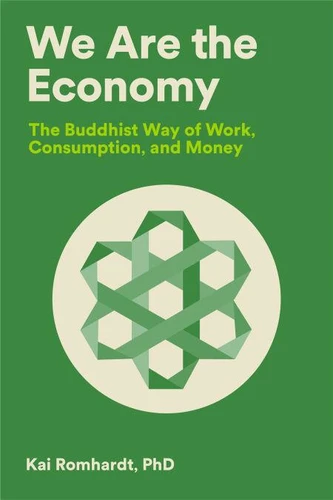We Are the Economy. The Buddhist Way of Work, Consumption, and Money
Par : , , ,Formats :
Disponible dans votre compte client Decitre ou Furet du Nord dès validation de votre commande. Le format ePub protégé est :
- Compatible avec une lecture sur My Vivlio (smartphone, tablette, ordinateur)
- Compatible avec une lecture sur liseuses Vivlio
- Pour les liseuses autres que Vivlio, vous devez utiliser le logiciel Adobe Digital Edition. Non compatible avec la lecture sur les liseuses Kindle, Remarkable et Sony
- Non compatible avec un achat hors France métropolitaine
 , qui est-ce ?
, qui est-ce ?Notre partenaire de plateforme de lecture numérique où vous retrouverez l'ensemble de vos ebooks gratuitement
Pour en savoir plus sur nos ebooks, consultez notre aide en ligne ici
- Nombre de pages256
- FormatePub
- ISBN978-1-946764-59-1
- EAN9781946764591
- Date de parution14/07/2020
- Protection num.Adobe DRM
- Taille4 Mo
- Infos supplémentairesepub
- ÉditeurParallax Press
Résumé
A no-nonsense Zen approach to our economic realities can change everything and help us regain our freedom. Is it possible to be personally fulfilled, and also make a difference within our current financial system? If you're skeptical, business coach and Zen practitioner Kai Romhardt proposes a minimalist, awareness-based strategy that totally reconfigures our core economic relationships: work, consumption, and money.
How do we do that? We need to pause, breathe, and get in touch with our true intentions. Too often, we think of the economy as something outside of us, as beyond the scope of our individual choices. We're unhappy with how things are going, with unthinking growth that polarizes our world and condenses wealth at the top, but we don't know what to do. Romhardt argues that individuals who wield a sharp Buddhist mindset can, in fact, create change through personal decisions: when we can see in to society, and in to our constructs, we become empowered to choose deeply real and purposeful lives.
How do we do that? We need to pause, breathe, and get in touch with our true intentions. Too often, we think of the economy as something outside of us, as beyond the scope of our individual choices. We're unhappy with how things are going, with unthinking growth that polarizes our world and condenses wealth at the top, but we don't know what to do. Romhardt argues that individuals who wield a sharp Buddhist mindset can, in fact, create change through personal decisions: when we can see in to society, and in to our constructs, we become empowered to choose deeply real and purposeful lives.
A no-nonsense Zen approach to our economic realities can change everything and help us regain our freedom. Is it possible to be personally fulfilled, and also make a difference within our current financial system? If you're skeptical, business coach and Zen practitioner Kai Romhardt proposes a minimalist, awareness-based strategy that totally reconfigures our core economic relationships: work, consumption, and money.
How do we do that? We need to pause, breathe, and get in touch with our true intentions. Too often, we think of the economy as something outside of us, as beyond the scope of our individual choices. We're unhappy with how things are going, with unthinking growth that polarizes our world and condenses wealth at the top, but we don't know what to do. Romhardt argues that individuals who wield a sharp Buddhist mindset can, in fact, create change through personal decisions: when we can see in to society, and in to our constructs, we become empowered to choose deeply real and purposeful lives.
How do we do that? We need to pause, breathe, and get in touch with our true intentions. Too often, we think of the economy as something outside of us, as beyond the scope of our individual choices. We're unhappy with how things are going, with unthinking growth that polarizes our world and condenses wealth at the top, but we don't know what to do. Romhardt argues that individuals who wield a sharp Buddhist mindset can, in fact, create change through personal decisions: when we can see in to society, and in to our constructs, we become empowered to choose deeply real and purposeful lives.



